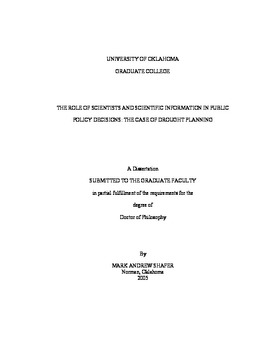| dc.contributor.advisor | James, Thomas E., | en_US |
| dc.contributor.author | Shafer, Mark Andrew. | en_US |
| dc.date.accessioned | 2013-08-16T12:19:58Z | |
| dc.date.available | 2013-08-16T12:19:58Z | |
| dc.date.issued | 2005 | en_US |
| dc.identifier.uri | https://hdl.handle.net/11244/949 | |
| dc.description.abstract | In addition to general interaction between the two communities, differences within elements of the communities also are highlighted. Scientists interact with policy-makers and the public at-large through several different roles, driven by their perceptions of how information is used in the policy process and their style of engagement. Policy-makers were found to have different roles, determined principally by their location in the state organizational hierarchy. | en_US |
| dc.description.abstract | The study was conducted between the summer of 2004 and spring of 2005. More than fifty individuals, representing both the scientific and state-level policy communities, were interviewed. Questions focused upon how scientists conducted and communicated their research, and information sources upon which policy-makers draw advice on creating state drought plans. The study uses a communications model, consisting of a sender (scientists), a message, and a receiver (policy-makers). An additional component, intermediary organizations and technical staff that help to integrate and reformat information, is included. This communication process takes place in an environment filled with competing messages, often detached from their sources, and noise. | en_US |
| dc.description.abstract | Does a cultural divide separate scientists from the broader community in which they live? This concept, proposed by C. P. Snow in 1964, has driven studies and reform movements within the scientific community for more than two decades. Calls to make science more relevant and to bridge barriers have been made. This study explores the concept of a cultural divide in the context of drought policy. Its goal is to examine whether such a cultural divide exists and if so, what mechanisms facilitate interaction across this divide. | en_US |
| dc.description.abstract | Findings suggest that these intermediary organizations are a key component in facilitating interaction between the two communities. Scientists, intermediary organizations, and technical staff from state agencies operate together in knowledge communities, in which information is shared for development of state policy. Scientific and technical information is integrated and formatted for easy access and inclusion into the state drought policy-making process. Scientists were willing to fashion information into usable contexts and policy-makers had little difficulty accessing or using information. | en_US |
| dc.description.abstract | This process has been effective at getting scientific information into plans, but has yet to yield many instances of successful implementation. Much of the scientists' involvement focuses on aspects of monitoring drought conditions. This is largely a technical question and avoids many of the difficult normative issues involved in mitigating exposure to drought. Because of this, state drought plans have improved in their abilities to serve as early-warning indicators, but have not yielded substantive changes in community behavior. In order to bridge the implementation barrier, scientists must become more involved in addressing the normative aspects of drought management. | en_US |
| dc.format.extent | xiv, 259 leaves : | en_US |
| dc.subject | Drought relief United States. | en_US |
| dc.subject | Political Science, General. | en_US |
| dc.subject | Urban and Regional Planning. | en_US |
| dc.subject | Droughts United States. | en_US |
| dc.subject | Science and state United States. | en_US |
| dc.title | The role of scientists and scientific information in public policy decisions: The case of drought planning. | en_US |
| dc.type | Thesis | en_US |
| dc.thesis.degree | Ph.D. | en_US |
| dc.thesis.degreeDiscipline | Department of Political Science | en_US |
| dc.note | Adviser: Thomas E. James. | en_US |
| dc.note | Source: Dissertation Abstracts International, Volume: 66-12, Section: A, page: 4520. | en_US |
| ou.identifier | (UMI)AAI3203309 | en_US |
| ou.group | College of Arts and Sciences::Department of Political Science | |
